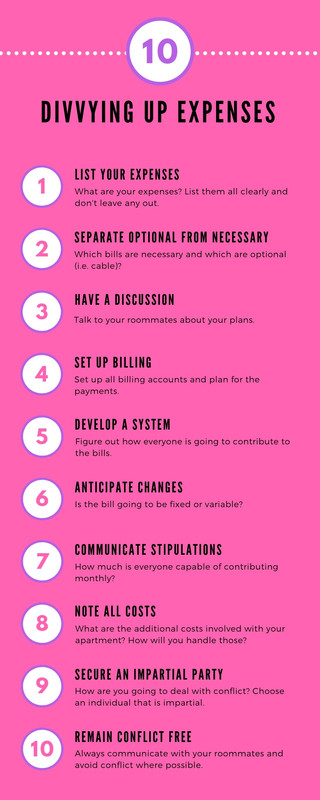How to Divvy Up Expenses with Your Roommates
Living with roommates is no easy task. More often than not, arguments ensue, and in terms of the content of those arguments, you can bet finance is largely involved. Getting a group of individuals in one place to share expenses isn’t a walk in the park, but it doesn’t have to be too hard, either.
So what’s the best way to fairly divvy up your expenses amongst your roommates? While there are a lot of variables to consider here, these 10 tips for divvying up expenses is a great starting point to conflict resolution!

1. List Your Expenses
Obviously not the most challenging part of the process, listing out your expenses for the year is a great way to begin any financial conversation. Simply create a detailed list of each additional expense (not covered by your lease) that you and your roommates are responsible for.
This includes, but isn’t limited to: rent, water, gas, electric, cable, internet, parking and any other additional fees that may not be clearly defined by your lease. While most leasing companies will fairly split lease bills amongst roommates, others will not, so it’s always better to be safe than sorry.
In this way, simply developing a list of all expenses will ensure that everyone is on the same page and that all potential bills are included in your discussion.
2. Separate Optional from Necessary
Here is one of the more challenging aspects of splitting bills: which are necessary and which are not? Consider the bills that everyone will contribute to because everyone takes advantage of gas, water and electric. These are necessities.
Now consider the bills that aren’t necessary to living situations, but that are enjoyed by most, if not all: cable, internet, and parking.
A large part of roommate conflict comes from who should contribute to these bills and who is reaping the benefits of the optional bills without contributing. By separating the necessities from the optional bills, you can have this discussion with your roommates. Is everyone going to use the cable? If not, who will split that cost? And how do you proceed if someone that isn’t contributing uses that item?
Again, these are challenging conversations, but splitting your bills into optional versus necessary will help to get you started.
3. Have a Discussion
Perhaps one of the most important items on this list, it is absolutely essential to have an open and honest discussion with all of your roommates regarding finances. This not only includes the above point on necessary versus optional bills, but it also comes down to who can afford what and how to proceed in terms of divvying up bills.
Never assume that your roommates all have the same budget that you do because odds are, they don’t. Expenses look different for everyone, so never assume something that is affordable to you is affordable to another as well.
Conversations between you and your roommates surrounding finance will only serve you better in the long run, especially considering the conflict that typically surrounds finance.
4. Set Up Billing
Once you’ve had the necessary discussions, it’s important that the roommates all work together to set up billing information. More often than not, only one person’s information is necessary to receive bills, so you must decide who will be that person for each account.
Many roommates put one name on all bills and split them up amongst themselves, others work directly with the company in question to ensure that everyone’s name is on the bill to avoid problems down the road. Whichever path you and your roommates choose for splitting up your bills, ensure that everyone is on the same page before you move forward.
Also note that some payment methods, such as credit, can incur additional costs and fees that all roommates may not be willing to pay. Just be sure that whatever method you’ve chosen is one that everyone agrees upon and that everyone is comfortable with, especially considering these hidden or extra fees.
It’s very easy with bills to be the individual that’s left with the bulk of the cost, so don’t fall victim to that problem! Again, it’s all about communication and ensuring that all of the roommates are on the same page at all times.
5. Develop a System
As previously stated, it’s very important for you and your roommates to develop a system in which you pay your bills on time and fairly, which is easier said than done. While you may have covered the billing information, there is still the problem of ensuring that the bill is paid on time every month.
Personally, my roommates and I put one person’s name on all of the bills for automatic payments linked to their credit card. This way, we ensured there was never a late fee on our bills. From here, the individual stuck the bill in question to the fridge with a magnet and everyone gave her a check with their quarter of the bill paid so she could deposit that to her account.
For some, this is the easiest way to pay bills. For others, this will not work. Basically, you need to develop a system that will work for each roommate and that will ensure your bills are paid on time and split as discussed by everyone.
This is another important conversation to have amongst the group. How does everyone plan to pay their share? What’s the easiest way to achieve that? Do you foresee any problems with these methods of payment? So long as everyone is communicating their questions and concerns with one another, you will be able to develop a system of payment that works for everyone and that you can fall back on throughout the academic year.

6. Anticipate Changes
That all being said, you also have to brace yourself for changes. The truth of the matter is things change, whether you’re prepared for that change or not.
For instance, in the summer, you may be paying more money to cool your apartment down, while in the winter you could be paying significantly more to heat it. Just because your bills are one rate one month does not mean they will be the same rate the following month. You have to anticipate the fact that your bill may change monthly, and that those changes may be significant.
While you can anticipate a fluctuation in water, gas and electric bills, also prepare for changes in your cable and internet bills, as rates can change without notice. Be sure to set expectations with your roommates in the event that rates go up, as sometimes this can mean the difference between a bill being affordable and not.
Basically, if you prepare for these events in advance and set expectations as far as how much you can afford at most per month, you will be in a better position when these unexpected changes come around.
7. Communicate Stipulations
As mentioned above, it’s always a good idea to communicate stipulations to bills prior to involving yourself. For instance, as mentioned above, if something is going to be too expensive for you, it’s better to mention that ahead of time than it is to mention it when it’s too late.
For example, what does your monthly budget look like for these bills? Are there any ways to cut costs to ensure you don’t exceed that budget? A good example of this is with the heat. Perhaps you’re looking to cut down on your heating costs, but the best way to do that is likely to set your thermostat to a lower temperature. This is something that you and your roommates will need to agree upon ahead of time, but that’s entirely doable.
In addition, to decrease cable costs, you can limit the amount of channels you receive. Some individuals may be willing to contribute a little more monthly for extra channels, or perhaps even pay a little extra to ensure they have cable in their rooms as well as in the main living space. There are plenty of ways to split bills and cut costs, but it requires communication amongst all of the roommates as well as the setting of clear expectations.
Wherever you can work together to cut costs, you can set those expectations ahead of time to ensure that everyone is on the same page when it comes to the monthly bill budget.
8. Note All Costs
Again, it’s absolutely essential that you note all of the costs associated with your bills. Each roommate can only be on the same page if everyone is aware of what the costs are going to be.
For my roommates and I, the easiest way to do this was to keep track of past bills so we could anticipate the amount of money we needed to save for the next bill. While some fluctuated from month to month, the average was pretty similar, which allowed us to guess how much we needed to contribute to bills on a monthly basis.
Some individuals hang the prices of each bill on their fridge so everyone can pay attention while others simply communicate the costs to each other once a month when it comes time to physically pay their bills.
Whatever your style, be sure that everyone is on the same page and aware of the costs and you’ll be successful in terms of avoiding conflict related to finance.
9. Secure an Impartial Party
Something that most roommates don’t secure, but that it would be helpful to have just in case, is a secured, impartial party. This is typically a mutual friend that all roommates agree can be impartial and step in during the event of a conflict.
For instance, let’s say you and your roommates disagree on who owes what on a bill. If your other roommates are unable to help make a decision, an impartial party can come in, hear the story out and make a decision that is fair and correct.
While this isn’t always a possibility (as there are many instances in which an entirely impartial person can be secured), this is a good idea to have in your back pocket, just in case.
10. Remain Conflict-Free
Throughout these 10 points, one theme is common: remain conflict-free. Basically, the best way to ensure this is achieved is through communication. Roommates must all communicate with one another in order to set expectations and ensure bills are divvied up fairly.
Additionally, however, remaining conflict-free is about maintaining an even, understanding temper so that, when potential conflict does arise, it’s easy to navigate away from it and remain conflict-free.
For example, if you foresee a problem with a bill due to an error in communication, let your roommates know as soon as you catch this problem and work together to brainstorm a solution. Or let’s say you forgot to pay a bill that you were responsible for and now there is a late fee. Rather than asking everyone for additional money, communicate the error and come up with a solution that everyone feels is accurate and fair.
There are plenty of ways in which a conflict can arise, especially when living in close proximity to one another and involving finance, an already touchy subject. Just be sure to work with one another and communicate as often as possible and you’ll be just fine!
Again, it’s hard enough living with other people, but conflicts involving expenses complicate this situation even further. So stop spending so much time worried about finances, divvy everything up fairly to avoid future conflicts, and enjoy the situation you’re in.
These 10 tips will help to get you started, but have a conversation with your roommates to ensure everyone is on the same page prior to divvying up expenses. Not only will this help put all conflict at ease, but it will also ensure you and your roommates are in a good financial position throughout the duration of your lease.

Interested in using our roommate matching formula to find the perfect college roommate for you? Create a profile & take the roommate quiz on Roomsurf! Get Started
